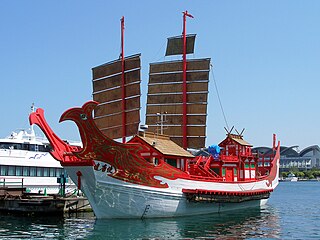The 630s decade ran from January 1, 630, to December 31, 639.
The 640s decade ran from January 1, 640, to December 31, 649.
The 650s decade ran from January 1, 650, to December 31, 659.
The 660s decade ran from January 1, 660, to December 31, 669.
The 670s decade ran from January 1, 670, to December 31, 679.
The 680s decade ran from January 1, 680, to December 31, 689.
The 570s decade ran from January 1, 570, to December 31, 579.

Year 743 (DCCXLIII) was a common year starting on Tuesday of the Julian calendar. The denomination 743 for this year has been used since the early medieval period, when the Anno Domini calendar era became the prevalent method in Europe for naming years.

Year 649 (DCXLIX) was a common year starting on Thursday of the Julian calendar. The denomination 649 for this year has been used since the early medieval period, when the Anno Domini calendar era became the prevalent method in Europe for naming years.

Year 659 (DCLIX) was a common year starting on Tuesday of the Julian calendar. The denomination 659 for this year has been used since the early medieval period, when the Anno Domini calendar era became the prevalent method in Europe for naming years.

Year 579 (DLXXIX) was a common year starting on Sunday of the Julian calendar. The denomination 579 for this year has been used since the early medieval period, when the Anno Domini calendar era became the prevalent method in Europe for naming years.

Year 643 (DCXLIII) was a common year starting on Wednesday of the Julian calendar. The denomination 643 for this year has been used since the early medieval period, when the Anno Domini calendar era became the prevalent method in Europe for naming years.

Year 653 (DCLIII) was a common year starting on Tuesday of the Julian calendar. The denomination 653 for this year has been used since the early medieval period, when the Anno Domini calendar era became the prevalent method in Europe for naming years.

Year 654 (DCLIV) was a common year starting on Wednesday of the Julian calendar. The denomination 654 for this year has been used since the early medieval period, when the Anno Domini calendar era became the prevalent method in Europe for naming years.

Year 682 (DCLXXXII) was a common year starting on Wednesday of the Julian calendar. The denomination 682 for this year has been used since the early medieval period, when the Anno Domini calendar era became the prevalent method in Europe for naming years.

Year 663 (DCLXIII) was a common year starting on Sunday of the Julian calendar. The denomination 663 for this year has been used since the early medieval period, when the Anno Domini calendar era became the prevalent method in Europe for naming years.

Year 672 (DCLXXII) was a leap year starting on Thursday of the Julian calendar. The denomination 672 for this year has been used since the early medieval period, when the Anno Domini calendar era became the prevalent method in Europe for naming years.
Year 679 (DCLXXIX) was a common year starting on Saturday of the Julian calendar. The denomination 679 for this year has been used since the early medieval period, when the Anno Domini calendar era became the prevalent method in Europe for naming years.

Fang Qiao, courtesy name Xuanling, better known as Fang Xuanling, posthumously known as Duke Wenzhao of Liang, was a Chinese statesman and writer who served as a chancellor under Emperor Taizong in the early Tang dynasty. He was the lead editor of the historical record Book of Jin and one of the most celebrated Tang dynasty chancellors. He and his colleague, Du Ruhui, were often described as role models for chancellors in imperial China.
The 600s decade ran from January 1, 600, to December 31, 609.











